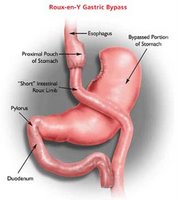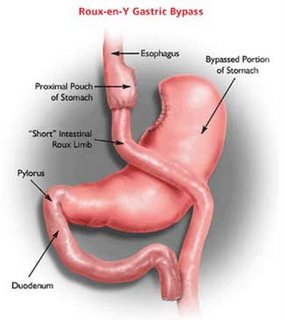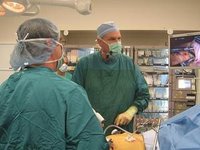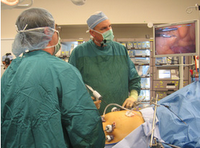Washington, D.C. (National Anemia Action Council)
In recent years, bariatric surgery has become a much more common procedure to treat morbidly obese patients in the United States, with the number of surgeries increasing more than 10-fold in the last decade.1 This growth has occurred in part due to the large number of obese and morbidly obese individuals in need of weight reduction and the relative success of the surgery at shedding excess weight and reducing obesity-related health conditions.
Yet, surgery often creates permanent alterations of the digestive tract, which can lead to a variety of nutritional consequences. Many bariatric patients develop new or worsen preexisting iron and vitamin deficiencies, with some patients becoming anemic in the months and years following the procedure. These patients may then be relying on you, their primary care providers, to monitor their nutritional health. This article explains why bariatric surgery patients are prone to developing nutritional deficiencies and what you can do help them avoid anemia.
Candidates for Bariatric Surgery
In 2008, about 220,000 bariatric surgeries were performed in the United States to help patients permanently reduce excess body weight.2 Only morbidly obese patients are eligible for the surgery, as determined by their body mass index (BMI) – calculated by weight relative to height (kg/m2). Patients with a BMI >40, or a BMI >35 in combination with comorbidities, are considered for bariatric surgery. Comorbidities may include type 2 diabetes, heart disease, hypertension and sleep apnea, among many others. Approximately 15 million people in the United States (about 5%) are considered morbidly obese and about one-third are considered obese, with a BMI >30.2,3
Prior to surgery, morbidly obese patients may have numerous chronic illnesses and health complications, including nutritional deficiencies and anemia. According to Dr. John W. Baker, President of the American Society for Metabolic & Bariatric Surgery (ASMBS), about 60% of his patients have low or deficient levels of vitamin B12 prior to surgery and about 20%, both male and female, had preoperative iron deficiency. This rate is consistent with current statistical data of nutritional deficiencies among bariatric surgery candidates.4
Although prevalent, the etiology of their preoperative anemia can be elusive, with some morbidly obese patients displaying evidence of both iron deficiency and chronic inflammation. In a considerable percentage of candidates, the cause of anemia may be undiagnosed. Dr. Baker advises that preoperative anemia should be treated prior to surgery either by the surgeon or by the patient’s primary doctor. Following bariatric surgery, the surgeon and the patient’s primary care doctor often communicate about continuing care of the patient to decide the roles and responsibilities of each physician in the postoperative period. This coordination is especially important for a patient with any preexisting anemia, which will need to be monitored closely.
The Surgery Itself
Bariatric surgery has a considerable impact on both a patient’s overall weight and many of the obesity-related conditions that affect quality of life. A meta-analysis of over 22,000 bariatric surgery patients revealed that patients lost on average 60% of their excess weight. In contrast, patients treated with conventional diet and exercise reported losing less than 10% of their excess weight for a sustained time period and exhibited only mild effects on reduction in obesity-related conditions.4
Studies have reported type 2 diabetes being resolved in 73-87% of patients following bariatric surgery, depending on the type of surgery.5,6 Risk of coronary heart disease was cut in half5 and sleep apnea was resolved in more than 85% of patients.7 Additionally, when compared to candidates who did not have surgery, patients improved their life expectancy 89% of the time8 and reduced their risk of premature death by 30-40%.9 Risk of death from diabetes, cancer, and from coronary artery disease was also reduced by 92%, 60%, and 56%, respectively.10
Speaking in regards to the effectiveness of bariatric surgery at treating concomitant conditions of obese patients, Dr. Baker said, “This is one of the most durable procedures we have for resolution of chronic diseases. What other procedure can improve hypertension, heart disease, diabetes, sleep apnea and high cholesterol?”
How bariatric surgery affects a patient is largely determined by the type of procedure and how it alters the mechanics of the digestive tract. Weight loss results from reduction in the capacity of the digestive tract and number of calories consumed (restrictive), alteration of the absorption of food (malabsorptive), or a combination of both approaches. Restrictive methods include vertical banded gastroplasty (VBG) and laparoscopic adjustable gastric banding (LAGB). Malabsorptive procedures with some restriction include biliopancreatic diversion (BPD) and biliopancreatic diversion with duodenal switch (BPD-DS). Restrictive procedures with some malabsorption include roux-en-Y gastric bypass (RYGB) and vertical banded gastric bypass.11
Following surgery, a patient’s body must get necessary nutrients from less food with a smaller, less effective digestive system. Although helpful in reducing their caloric intake and fat absorption, these physical and metabolic changes leave them susceptible to nutritional deficiencies and subsequent anemia. Depending on the form of bariatric surgery, alterations to the digestive tract which may lead to an increase in nutritional deficiencies and anemia include the:
* Lower intake of food and essential nutrients
* Decrease in the absorptive surface area in the digestive tract
* Decrease in available stomach acid to help break down food and nutrients
* Possible intolerance to some nutrient-rich foods, such as red meat
Nutritional Deficiencies Related to Anemia
Iron deficiency is the most common cause of anemia after bariatric surgery and can be found in 20-49% of patients. This is especially true after the RYGB procedure in menstruating women (51%) and in patients with super obesity (49-52%).12 Other deficiencies which can lead to anemia are less common, but do include vitamin B12 and folic acid, which are most common in patients who exhibited signs of the deficiency prior to surgery or who are not receiving adequate supplementation. For instance, vitamin B12 deficiencies can occur in older patients, patients taking H2 blockers or proton pump inhibitors (PPIs), or in roughly 12-33% of patients not receiving supplementation after the RYGB procedure.
Baker quoteAlthough these deficiencies are mostly related to the altered absorption in the digestive tract, all forms of bariatric surgery can contribute to lower serum levels or reduced stores of nutrients. Dr. Baker has observed that, “Even in patients who didn’t have a malabsorptive procedure, I still see them coming in with deficiencies at follow-up; often due to preoperative deficiencies or preexisting conditions.”
The ASMBS Allied Health Nutritional Guidelines for the Surgical Weight Loss Patient states that, “Taking daily micronutrient supplements and eating foods high in vitamins and minerals are important aspects of any successful weight loss program. For the morbidly obese, taking vitamin and mineral supplements is essential for appropriate micronutrient repletion both before and after bariatric surgery.” The surgeon will recommend the necessary vitamins during presurgical education and consultation. Concerning anemia-related nutrients, these recommendations include a multivitamin with at least 100% of daily value for vitamin B12, 18 mg of iron, and 400 μg of folic acid. Following surgery, an additional vitamin B12 supplement or oral iron supplement may be required if monitoring indicates low or deficient levels of these nutrients.12 Patients may also be taking a recommended 1200 mg of calcium citrate daily, but should not ingest it at the same time as an oral iron supplement because the two will compete for absorption.
Continuing Care Following Surgery
Surgical patients are typically enrolled in postoperative programs to help them adjust to their new lifestyle and reinforce compliance with recommended dietary restrictions and nutritional supplementation. All patients in these programs are instructed to take multivitamin supplements, usually with iron. Many physicians recommend life-long supplementation, with iron-deficient patients being treated initially with oral iron. Patients who cannot or will not take oral iron because of gastrointestinal side effects may need to receive the generally more tolerable ferrous fumarate oral preparation or parenteral iron supplementation.
Postoperative nutritional care puts a great deal of responsibility on the patient who may not realize the drastic nature of the procedure as it relates to nutrient absorption and the need to comply with supplementation and follow-up care. It can be difficult for patients to adhere to these programs with many of them dropping out 3-6 months after surgery. Dr. Annette von Drygalski, a hematologic fellow at the University of California-San Diego who has worked with many anemic patients following bariatric surgery, has witnessed this. She said, “Some patients may not be educated enough about the surgery and some may not even remember what procedure they had. And, because bariatric surgery is a relatively new field, some physicians may not be educated about the nutritional implications.” Patients may remain healthy for a short time and may attribute postoperative symptoms of fatigue to the procedure alone while deficiencies develop. Iron deficiency and other causes of anemia can manifest years later, potentially putting primary care physicians in a tough spot.
“Sometimes patients won’t follow-up with anybody until they finally develop a complication,” noted Dr. Baker. “We encourage our patients to identify their primary care physician so that lab work and recommendations can be shared. This way, physicians can identify patients who are not following up after the surgery.”
Monitoring Nutrition & Deficiencies
Patients are often enrolled in a postsurgical program operated by the surgical team. Programs of this nature normally require patients to attend follow-up visits at the first, third, sixth and 12th months to monitor their overall health and address any symptoms they may be experiencing. At a minimum, screening for nutritional deficiencies occurs at the 6-month and 12-month visits. Adjustments to a patient’s dietary supplementation levels, initially set by the surgeon, may occur at these visits, if necessary. Some patients prefer to have these visits coordinated with their primary doctors instead of with the surgical team. In this case, the primary doctor should continue to update the surgical team of the patient’s care and status, and the surgeon should remain available for consultation.
Information for Bariatric Surgery Patients
* Bariatric surgery is not harmless, it drastically alters your body
* There are lifelong dietary and nutritional considerations
* You may not absorb vitamins or iron as well from the food you eat
* It is important to follow vitamin and iron supplementation
* Do not take iron supplements with tea, cola, coffee, calcium citrate or levothyroxine
* Remember the type of surgery you had performed and be sure to tell your doctor
If you are working with a known bariatric surgery patient for the first time, even if you have not had prior consultation with their surgeon, Dr. Baker recommends inquiring about their dietary intake, types of foods they eat, their menstrual blood loss if they are female, and any symptoms of fatigue which could be related to anemia, in addition to monitoring their levels of iron, vitamin B12 and folate as described below. Notable things to watch for include excess tea, cola or coffee consumption, which may interfere with iron conversion to an absorbable form. If taking an iron supplement, it is necessary to wait at least two hours before drinking any tea, taking calcium supplements, or taking the synthetic thyroid hormone levothyroxine. If possible, communication with their surgeon about recommended supplementation and follow-up care should be pursued prior to subsequent visits.
The first step in screening for anemia is acquiring a complete blood count that includes red blood cell indices. If anemia is present – determined by a hemoglobin <12 g/dL in women and <13 g/dL in men – indices can point toward the appropriate further investigation.13 Patients with a microcytic, hypochromic anemia most likely have an iron deficiency. Vitamin B-12 deficiency produces macrocytic red blood cells. Remember that the cause of anemia may be multi-factorial, so indices are not the final answer. Some screening guidelines of anemia-related nutrients, taken in part from the ASMBS Allied Health Nutritional Guidelines for the Surgical Weight Loss Patient,12 are listed below.
Iron – Ferritin levels should be checked at six months, one year and annually at a minimum following bariatric surgery. A normal ferritin level for men is 15-200 ng/mL and for women is 12-150 ng/mL.12 Also check serum iron (normal range 60-170 mcg/dL), total iron binding capacity (normal range 240-450 mcg/dL) and transferrin saturation (normal range 20-50%). Note that normal ranges vary by lab, so be sure to check for their established levels.
Related Research Review
A recent research review of the study by Coupaye et al prospectively compared the prevalence of nutritional deficiencies after adjustable gastric banding and gastric bypass procedures. Read more about the study in Research Reviews:
Evaluation of Short-term Nutritional Regimens Following Bariatric Surgery
Vitamin B12 – Serum B12 levels should be checked at six months, one year and annually at a minimum following bariatric surgery. A normal vitamin B12 range is 200-900 pg/mL,14 but serum measurements may miss 25-30% of deficiency cases in lower normal ranges. If symptoms of a vitamin B12 deficiency are present (including fatigue, bright red/smooth tongue or tingling/numbness in hands and feet) and vitamin B12 levels are 200-250 pg/mL, MMA and tHcy measurements may help identify the cause.12
Folate – RBC folate should be checked at six months, one year and annually at a minimum following bariatric surgery. A normal RBC folate range is 280-791 ng/mL, with a deficiency present at <305 nmol/L and the presence of anemia <227 nmol/L.12 Serum folate more closely reflects recent dietary intake than actual folate status measured by RBC folate. Although relatively uncommon before and after bariatric surgery, folate deficiencies should be monitored, especially in women who may become pregnant.
The Lasting Effects
Bariatric surgery and the behavioral changes patients adopt have shown to be very effective reducing excess weight and the effects of obesity-related health conditions. However, the physical and metabolic alterations as a result of the procedure must be monitored by patients and their healthcare providers for the rest of their lives.
A dedication to following supplementation recommendations and monitoring nutrient levels should be incorporated into routine care which the patient can follow, the primary care physician can execute, and which allows the bariatric surgeon to remain informed and available for consultation.
Labels: gastric bypass diet, gastric bypass risks, gastric bypass side effects, gastric bypass surgery education

















